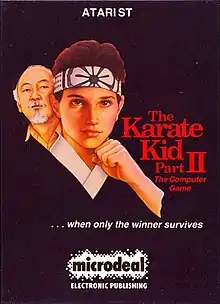The Karate Kid Part II: The Computer Game
The Karate Kid Part II: The Computer Game is a fighting game based on the 1986 film The Karate Kid Part II. It was initially released for the Atari ST in 1986,[1] and an Amiga port was published in 1987.[2][3][4] It was published by Microdeal in Europe and the United States,[3][5] and by Ozisoft in Australia.[6]
| The Karate Kid Part II: The Computer Game | |
|---|---|
 | |
| Developer(s) | Microdeal |
| Publisher(s) | Microdeal Ozisoft (AUS) |
| Designer(s) | Steve Bak |
| Artist(s) | Pete Lyon |
| Series | The Karate Kid |
| Platform(s) | |
| Release | Atari STAmiga |
| Genre(s) | Fighting |
| Mode(s) | Single-player, multiplayer |
Gameplay
The Karate Kid Part II is a fighting game. For much of the game, the player controls Daniel LaRusso, who faces off against various opponents in karate matches. The player can use a variety of attack moves, including roundhouse kicks and flying kicks. Some moves are more effective than others. The game includes two bonus levels played occasionally after fights. In one bonus level, the player controls Mr. Miyagi as he tries to catch a fly using chopsticks. In the other bonus level, Daniel must break blocks of ice. The game also includes a two-player option.[6][3][4][7]
Reception
| Publication | Score |
|---|---|
| ACE | 720/1000 (Amiga)[2] |
| Amiga Today | 91/100 (Amiga)[6] |
| Commodore User | 8/10 (Amiga)[3] |
| .info | |
| Popular Computing Weekly | 4/5 (Atari ST)[1] |
| Your Computer | 4/5 (Atari ST)[7] |
The Karate Kid Part II received praise for its graphics,[2][6][3][5][1][8][9][10][11] although some reviewers were critical of the small character designs.[3][4][7][10] The sound was praised as well,[6][4][5][8] while the music received positive[5][6] and negative responses.[3][4][11]
Francis Jago of Commodore User called it "an excellent combat/fighting game which really does the Amiga justice." Jago praised the game's loading sequence, and wrote that many of the film's sequences "have been faithfully recreated" for a game that "is a much more acceptable film tie-in than some."[3] Computer and Video Games praised the quick execution of the various attacks, stating that it put the game "in a slightly higher category than most other" beat 'em up games.[4] Benn Dunnington of .info praised the game's joystick control, calling it "natural and responsive".[5] Duncan Evans of Popular Computing Weekly wrote that film-based games "often don't live up" to the source material, while stating that The Karate Kid Part II " exceeds all expectations."[1]
Author Jamie Lendino wrote in 2019 that the game had two benefits, stating that was released at a time when there were "still precious few games available for the ST, and it was actually good" considering it was a film tie-in. Lendino praised the backdrops, sound effects, and the "fluid animation and precise control."[12]
References
- Evans, Duncan (11 December 1987). "The kid's a hit". Popular Computing Weekly. United Kingdom. p. 23.
- "Karate Kid 2". ACE. United Kingdom. November 1987. p. 75.
- Jago, Francis (September 1987). "Karate Kid II". Commodore User. United Kingdom. pp. 66–67.
- "Karate Kid II (Amiga)". Computer and Video Games. United Kingdom. October 1987. p. 91.
- Dunnington, Benn (January 1988). "Karate Kid Part II". .info. United States. pp. 6, 10.
- Phelps, Jason (July 1987). "Karate Kid II". Amiga Today. Australia. p. 15. Published as part of volume 4, issue 7 of The Australian Commodore and Amiga Review (July 1987).
- McClure, Jim (March 1987). "Karate Kid Part II". Your Computer. United Kingdom. p. 52.
- Kleimann, Manfred (February 1987). "Action Games: Daniel Düsentrieb". Aktueller Software Markt (in German). Germany. p. 6.
- Kern, Thomas (May 1987). "The Karate Kid Part II (Atari ST)". Atari Magazin (in German). Germany. pp. 102–103.
- Kunkel, Bill (May 1988). "The Karate Kid Part II". ST-Log. United States. p. 77.
- Campbell, Phil (24 August 1987). "You will get a good kick out of these". The Sydney Morning Herald. Retrieved 13 November 2019 – via Newspapers.com.
- Lendino, Jamie (2019). Faster Than Light: The Atari ST and the 16-Bit Revolution. Steel Gear Press. pp. 103–104. ISBN 9781732355217. Retrieved 13 November 2019.
External links
- The Karate Kid Part II at Atari Mania
- The Karate Kid Part II at Lemon Amiga
